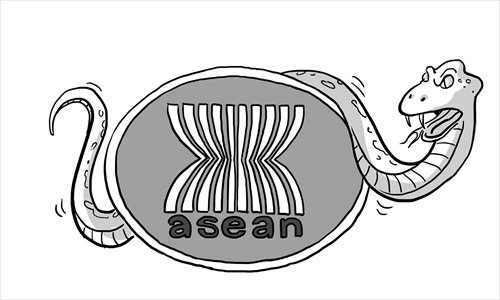ASEAN can tackle religious divides

The riots between Buddhists and Muslims in late March in Myanmar have led to dozens of deaths. This religious violence is not an isolated case in Southeast Asia.
There have been numerous attacks on Christian churches by Indonesia's extreme Islamists. In the Northern Philippines, the conflicts between anti-government groups with an Islamic background and the Catholics that make up a majority of the country's population are never ending. Some independent churches in Vietnam and Laos would sometimes suffer from attacks triggered by religious hatred.
Southeast Asia has a solid, thriving and diverse religious tradition. No single religious sect can hold a dominant position. Meanwhile, as ethnic divisions often have a religious component, ethnic and religious problems may overlap. Domestic religious crises may evolve into regional political threats.
Historical reasons contribute to the ethnic and religious problems in Southeast Asia. Hard-line religious cultures have been forcefully imported into the region. The changing political powers behind those religions contribute to the changes in the religious population.
Tough governments in many Southeast Asian countries have suppressed the development of local religions. Their discriminatory religious policies in the past sowed the seed for future religious problems. As the political environment became more relaxed, various religions have revived, and also taken revenge, which was made use of by separatists and terrorists.
ASEAN is an important regional organization in Southeast Asia. If ASEAN wants to establish a more integrated and effective regional community, it should have a clear understanding of its role in solving religious and racial issues.
Due to its long-embraced non-interference principle and the limitation of its own strength, ASEAN's role has been limited to only being an observer in most cases. When a religious or racial crisis happens, it doesn't want to mount pressures on a particular government. This helps little in the region's political and economic development and fails to provide positive guidance.
If ASEAN acts as an authoritative supervisor in religious issues, it will be seen as political interference. It contradicts the international principle of separation of religion from politics and violates ASEAN's principle of non-interference.
Another possible role for ASEAN is as a neutral mediator. This might be ideal for ASEAN, but requires the group to improve its capabilities. In comparison, the EU has set a good example in solving religious and racial issues, ever though ASEAN faces more severe problems than the EU.
A highly integrated regional political union will bring more mobilization of personnel and logistical supplies, while deepening interactions among different groups will bring problems that should not be underestimated.
Some Western observers think that ASEAN's noninterference policy has restrained its potential constructive role in solving religious conflicts. Blindly promoting an ASEAN community while ignoring religious chasms will only result in hard-line groups congregating in border areas. Resolving the estrangement among different religious groups and promoting a diverse religious culture is a tough test of politicians' skills and wisdom. It also requires ordinary believers to share common values.
A regional institution that excludes itself from religious problems cannot tackle the region's realities. Establishing a political union that respects, understands and tolerates the religious consensus and helps urge member countries to create a domestic environment that is politically transparent and economically favorable will benefit the development of the whole region.
The problems should not be dealt with carelessly, or they will damage social stability or even regional security. As ASEAN ensures economic cooperation, it should consolidate ideas of religious equality. When a religious conflict occurs, it should play an active role to protect the vulnerable and mediate between parties. A stable social foundation is the basis for ASEAN's existence and effective operation.
The author is an assistant research fellow at the Political Science Institute at the East China University of Political Science and Law. opinion@globaltimes.com.cn